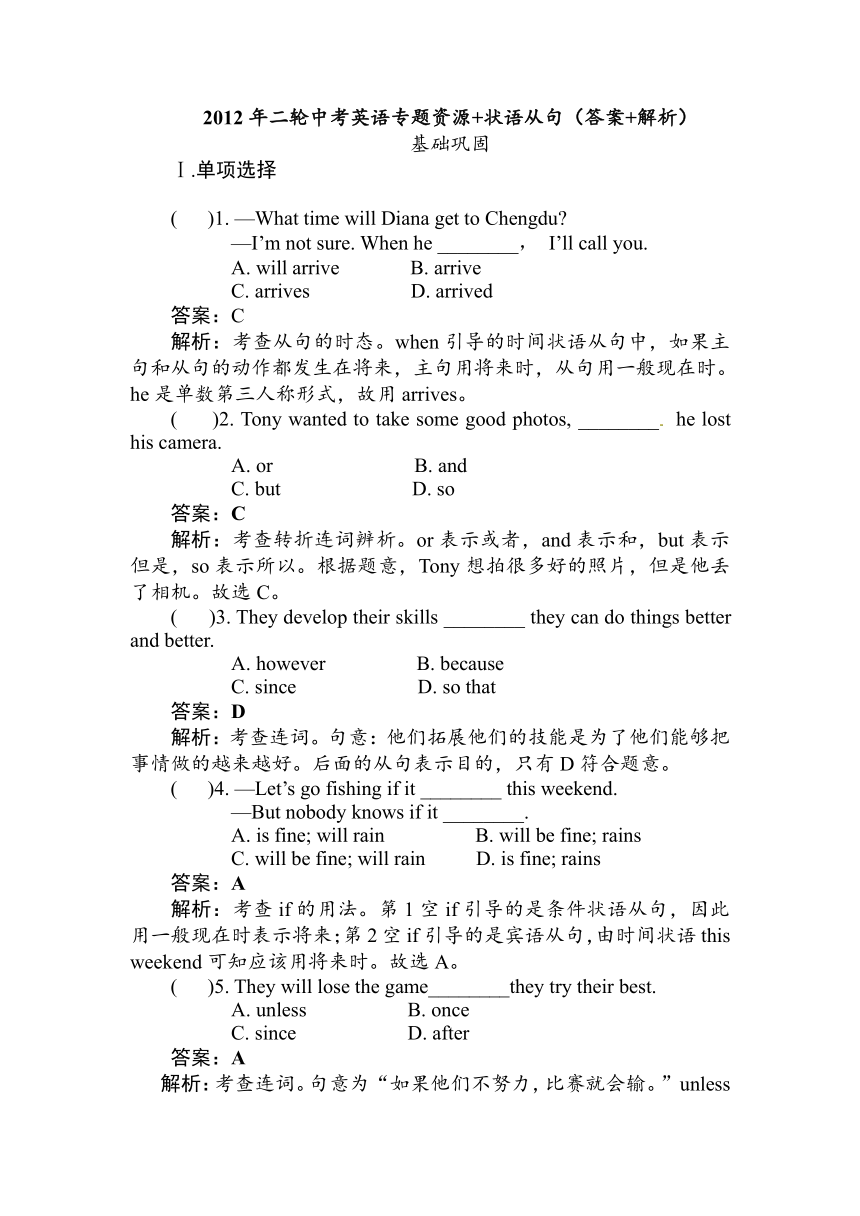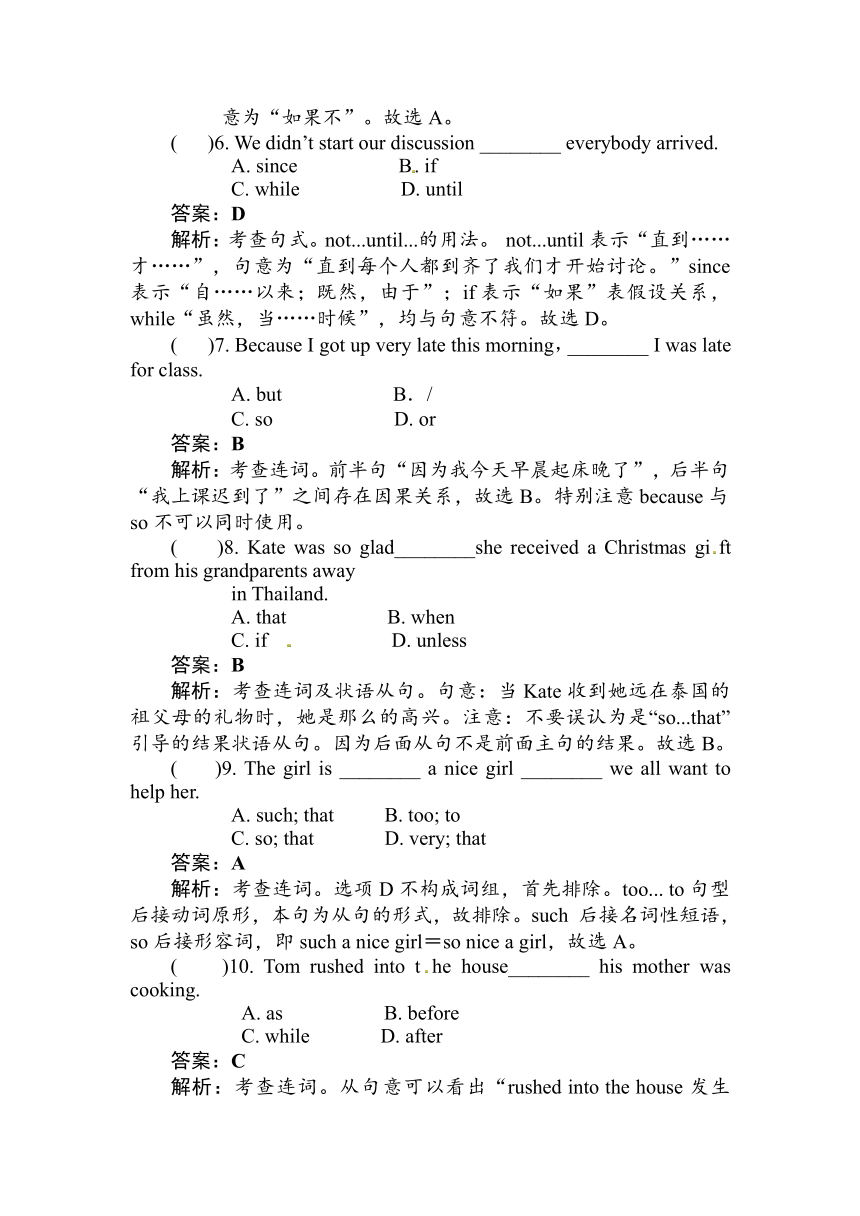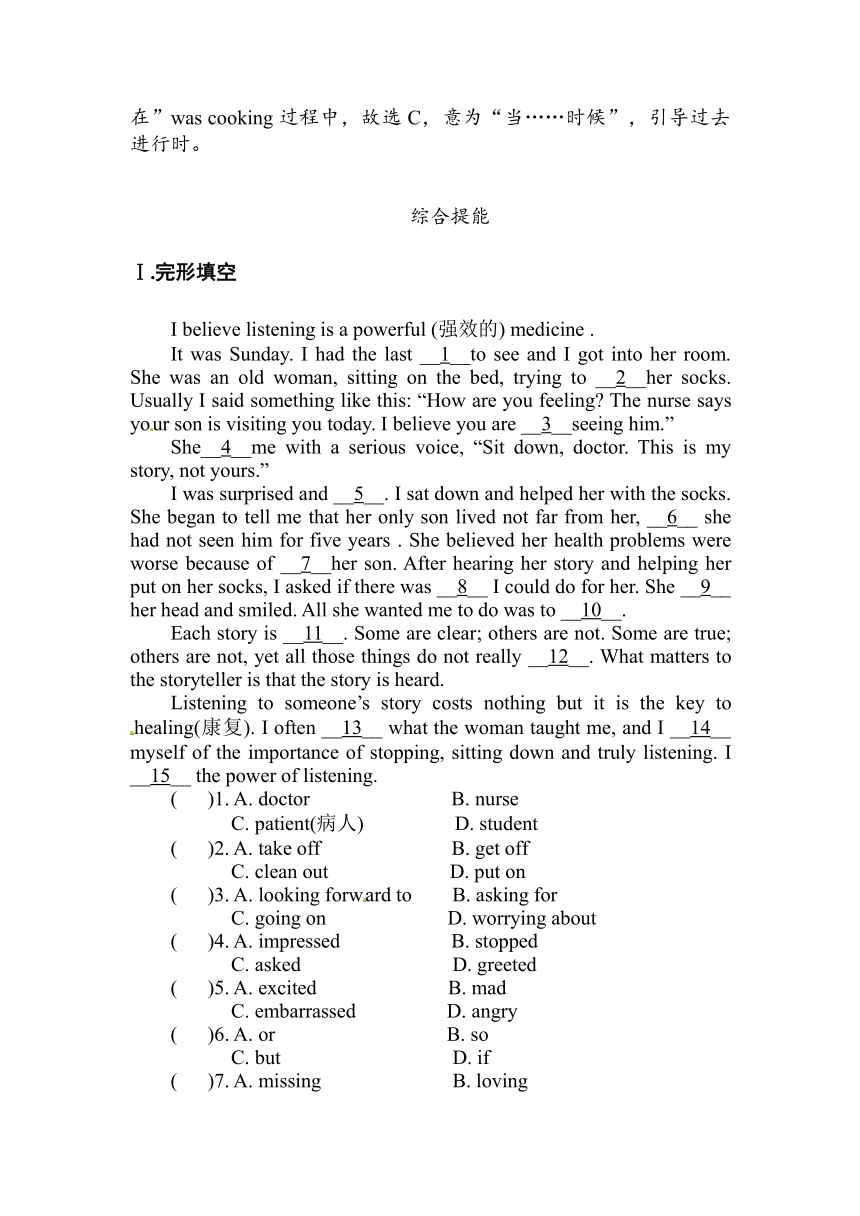2012年二轮中考英语专题资源+状语从句(答案+解析)
文档属性
| 名称 | 2012年二轮中考英语专题资源+状语从句(答案+解析) |

|
|
| 格式 | zip | ||
| 文件大小 | 17.7KB | ||
| 资源类型 | 教案 | ||
| 版本资源 | 通用版 | ||
| 科目 | 英语 | ||
| 更新时间 | 2012-04-24 00:00:00 | ||
图片预览



文档简介
2012年二轮中考英语专题资源+状语从句(答案+解析)
基础巩固
Ⅰ.单项选择
( )1. —What time will Diana get to Chengdu
—I’m not sure. When he ________, I’ll call you.
A. will arrive B. arrive
C. arrives D. arrived
答案:C
解析:考查从句的时态。when引导的时间状语从句中,如果主句和从句的动作都发生在将来,主句用将来时,从句用一般现在时。he是单数第三人称形式,故用arrives。
( )2. Tony wanted to take some good photos, ________ he lost his camera.
A. or B. and
C. but D. so
答案:C
解析:考查转折连词辨析。or表示或者,and表示和,but表示但是,so表示所以。根据题意,Tony想拍很多好的照片,但是他丢了相机。故选C。
( )3. They develop their skills ________ they can do things better and better.
A. however B. because
C. since D. so that
答案:D
解析:考查连词。句意:他们拓展他们的技能是为了他们能够把事情做的越来越好。后面的从句表示目的,只有D符合题意。
( )4. —Let’s go fishing if it ________ this weekend.
—But nobody knows if it ________.
A. is fine; will rain B. will be fine; rains
C. will be fine; will rain D. is fine; rains
答案:A
解析:考查if的用法。第1空if引导的是条件状语从句,因此用一般现在时表示将来;第2空if引导的是宾语从句,由时间状语this weekend可知应该用将来时。故选A。
( )5. They will lose the game________they try their best.
A. unless B. once
C. since D. after
答案:A
解析:考查连词。句意为“如果他们不努力,比赛就会输。”unless意为“如果不”。故选A。
( )6. We didn’t start our discussion ________ everybody arrived.
A. since B. if
C. while D. until
答案:D
解析:考查句式。not...until...的用法。 not...until表示“直到……才……”,句意为“直到每个人都到齐了我们才开始讨论。”since表示“自……以来;既然,由于”;if表示“如果”表假设关系,while“虽然,当……时候”,均与句意不符。故选D。
( )7. Because I got up very late this morning,________ I was late for class.
A. but B./
C. so D. or
答案:B
解析:考查连词。前半句“因为我今天早晨起床晚了”,后半句“我上课迟到了”之间存在因果关系,故选B。特别注意because与so不可以同时使用。
( )8. Kate was so glad________she received a Christmas gift from his grandparents away
in Thailand.
A. that B. when
C. if D. unless
答案:B
解析:考查连词及状语从句。句意:当Kate收到她远在泰国的祖父母的礼物时,她是那么的高兴。注意:不要误认为是“so...that”引导的结果状语从句。因为后面从句不是前面主句的结果。故选B。
( )9. The girl is ________ a nice girl ________ we all want to help her.
A. such; that B. too; to
C. so; that D. very; that
答案:A
解析:考查连词。选项D不构成词组,首先排除。too... to句型后接动词原形,本句为从句的形式,故排除。such 后接名词性短语,so后接形容词,即such a nice girl=so nice a girl,故选A。
( )10. Tom rushed into the house________ his mother was cooking.
A. as B. before
C. while D. after
答案:C
解析:考查连词。从句意可以看出“rushed into the house发生在”was cooking过程中,故选C,意为“当……时候”,引导过去进行时。
综合提能
Ⅰ.完形填空
I believe listening is a powerful (强效的) medicine .
It was Sunday. I had the last __1__to see and I got into her room. She was an old woman, sitting on the bed, trying to __2__her socks. Usually I said something like this: “How are you feeling The nurse says your son is visiting you today. I believe you are __3__seeing him.”
She__4__me with a serious voice, “Sit down, doctor. This is my story, not yours.”
I was surprised and __5__. I sat down and helped her with the socks. She began to tell me that her only son lived not far from her, __6__ she had not seen him for five years . She believed her health problems were worse because of __7__her son. After hearing her story and helping her put on her socks, I asked if there was __8__ I could do for her. She __9__ her head and smiled. All she wanted me to do was to __10__.
Each story is __11__. Some are clear; others are not. Some are true; others are not, yet all those things do not really __12__. What matters to the storyteller is that the story is heard.
Listening to someone’s story costs nothing but it is the key to healing(康复). I often __13__ what the woman taught me, and I __14__ myself of the importance of stopping, sitting down and truly listening. I __15__ the power of listening.
( )1. A. doctor B. nurse
C. patient(病人) D. student
( )2. A. take off B. get off
C. clean out D. put on
( )3. A. looking forward to B. asking for
C. going on D. worrying about
( )4. A. impressed B. stopped
C. asked D. greeted
( )5. A. excited B. mad
C. embarrassed D. angry
( )6. A. or B. so
C. but D. if
( )7. A. missing B. loving
C. understanding D. meeting
( )8. A. nothing else B. anything else
C. nothing D. everything
( )9. A. shook B. dropped
C. waved D. moved
( )10. A. see B. smell
C. listen D. feel
( )11. A. terrible B. different
C. similar D. true
( )12. A. happen B. appear
C. matter D. change
( )13. A. think of B. dream of
C. remind D. laugh at
( )14. A. teach B. ask
C. remind D. cheer
( )15. A. talk about B. show of
C. believe in D. run out of
语篇解读:我是一个医生。有一天由遇到了一个老人,她来看病,但她只是需要倾诉。从此我明白倾听不需要花费什么,但它是是一副强效药。
1. C。由下文老人称我为医生。故可知此处填入patient(病人)。
2. D。上文:我进入她的房间。判断老人要起来,故此处为put on穿上(袜子)。
3. A。下文:老人已经有5年没见到儿子了。故look forward to 意为“盼望着”符合题意。
4. B。句意:老人打断我的话。stop “阻止”符合题意。
5. C。因为话被打断,故我有点尴尬(embarrassed)。
6. C。上文:儿子住得离她不远。与下文:她们已有5年没见了。形成转折关系。故用but。
7. A。很久没见儿子,故此处用想念(missing)。
8. B。句意:我问她是否有其他事我能为她做的。anything else用于条件状语从句中意为“任何其它的事”。
9. A。她摇头(shook)表示不需要我为她做事。
10. C。全文说的是倾听(listen)。
11. B。下文:一些是……, 另一些是……。说明每个故事的different(不同的)。
12. C。与“故事”相对应的动词应是“发生(happen)”。
13. A。句意:我经常想起老人教给我的东西。think of 想起。
14. C。固定短语搭配remind...of...提醒……
15. C。与首句响应。故选believe in相信。
Ⅱ.阅读理解
People often say that the Englishman’s home is his castle. They mean that the home is very important and personal to him. Most people in Britain live in houses rather than flats, and many people own their homes. This means that they can make them individual(个体的); they can paint them, and change them in any way they like. Most houses have a garden, even if it is a very small one, and the garden is usually loved. The house and garden are the private(私人的) space of the individual.
People usually like to mark their space. Are you sitting now in your home or on a train Have you marked the space around yourself as yours If you are on the train you may put your coat or small bag on the seat beside you. If you share a flat you may have one corner or chair which is your own.
Once I was traveling on a train to London. I was in a section for four people and there was a table between us. The man on the opposite side to me had his briefcase on the table. There was no space on my side of the table at all. I got angry. Maybe he thought that he owned the whole table. I had read a book about nonverbal communication, so I took various papers out of my bag and put them on his briefcase! When I did this he stiffened and his eyes nearly popped(瞪出) out of his head. I had invaded(侵犯) his space! A few minutes later I took my papers off his case in order to read them. He immediately moved his case to his side of the table. Of course, it is possible that he just wanted to be helpful to me!
If you are visiting another country you may feel that you don’t have any private space. Hotel rooms look much the same in every country in the world. All day long, you share public spaces with other people. You see the local people in their private spaces and you_feel_lonely_and_“outside”. Local people can create their private spaces by talking about things you don’t know about. And you even feel that they like you to be outside them so that they will enjoy being inside even more! This is one of the difficulties of being a traveler! But if you understand it then it helps you. Haven’t you enjoyed being part of a group and “owning” a bit of space?(2010南京)
( )1. The writer was angry as he was traveling on a train to London because ________.
A. he had no place to sit
B. someone had invaded his “space”
C. too many people shared a section with him
D. some other people talked about things he didn’t know
( )2. “...you_feel_lonely_and_’outside’” in Paragraph 4 means that ________.
A. you are alone outside the house
B. you feel lonely because you travel on your own
C. you are alone and therefore you go outside to have some fun
D. you feel lonely and you don’t belong to that place or that group of people
( )3. In Paragraph 4, the pronoun “them” refers to (所指) “________”.
A. public B. private spaces
C. local people D. other countries
( )4. Which of the following is TRUE according to the passage
A. British people dislike marking their space.
B. You always feel at home in another country.
C. Most British people prefer living in houses to flats.
D. You can’t mark your private space in a foreign country.
( )5. The main purpose of the passage is to tell readers to ________.
A. own private spaces by living in houses
B. have one corner of their own in public places
C. realize the important of “space” in communication
D. create their private space by talking with local people
语篇解读:本文为记叙文。作者通过一些例子告诉读者,在和他人交流时应意识到“空间”的重要性。
1. B。细节理解题。根据第三段第三、四、五句可知有人把手提包放到了大家共用的桌子上,侵犯了别人的空间。故选B。
2. D。猜测词义题。由第中段第三、四、五句可知画线部分的意思是你不属于当地或当地的人。
3. C。猜测词义题。由上一句可知此处“他们”是指当地的人。
4. C。细节理解题。根据第一段第三句可知大多数英国人都喜欢住在一套房子里,而不是公寓式的房子里。
5. C。归纳概括题。通读全文可知,作者旨在告诉读者,在和他人的交流中应意识到“空间”的重要性。
基础巩固
Ⅰ.单项选择
( )1. —What time will Diana get to Chengdu
—I’m not sure. When he ________, I’ll call you.
A. will arrive B. arrive
C. arrives D. arrived
答案:C
解析:考查从句的时态。when引导的时间状语从句中,如果主句和从句的动作都发生在将来,主句用将来时,从句用一般现在时。he是单数第三人称形式,故用arrives。
( )2. Tony wanted to take some good photos, ________ he lost his camera.
A. or B. and
C. but D. so
答案:C
解析:考查转折连词辨析。or表示或者,and表示和,but表示但是,so表示所以。根据题意,Tony想拍很多好的照片,但是他丢了相机。故选C。
( )3. They develop their skills ________ they can do things better and better.
A. however B. because
C. since D. so that
答案:D
解析:考查连词。句意:他们拓展他们的技能是为了他们能够把事情做的越来越好。后面的从句表示目的,只有D符合题意。
( )4. —Let’s go fishing if it ________ this weekend.
—But nobody knows if it ________.
A. is fine; will rain B. will be fine; rains
C. will be fine; will rain D. is fine; rains
答案:A
解析:考查if的用法。第1空if引导的是条件状语从句,因此用一般现在时表示将来;第2空if引导的是宾语从句,由时间状语this weekend可知应该用将来时。故选A。
( )5. They will lose the game________they try their best.
A. unless B. once
C. since D. after
答案:A
解析:考查连词。句意为“如果他们不努力,比赛就会输。”unless意为“如果不”。故选A。
( )6. We didn’t start our discussion ________ everybody arrived.
A. since B. if
C. while D. until
答案:D
解析:考查句式。not...until...的用法。 not...until表示“直到……才……”,句意为“直到每个人都到齐了我们才开始讨论。”since表示“自……以来;既然,由于”;if表示“如果”表假设关系,while“虽然,当……时候”,均与句意不符。故选D。
( )7. Because I got up very late this morning,________ I was late for class.
A. but B./
C. so D. or
答案:B
解析:考查连词。前半句“因为我今天早晨起床晚了”,后半句“我上课迟到了”之间存在因果关系,故选B。特别注意because与so不可以同时使用。
( )8. Kate was so glad________she received a Christmas gift from his grandparents away
in Thailand.
A. that B. when
C. if D. unless
答案:B
解析:考查连词及状语从句。句意:当Kate收到她远在泰国的祖父母的礼物时,她是那么的高兴。注意:不要误认为是“so...that”引导的结果状语从句。因为后面从句不是前面主句的结果。故选B。
( )9. The girl is ________ a nice girl ________ we all want to help her.
A. such; that B. too; to
C. so; that D. very; that
答案:A
解析:考查连词。选项D不构成词组,首先排除。too... to句型后接动词原形,本句为从句的形式,故排除。such 后接名词性短语,so后接形容词,即such a nice girl=so nice a girl,故选A。
( )10. Tom rushed into the house________ his mother was cooking.
A. as B. before
C. while D. after
答案:C
解析:考查连词。从句意可以看出“rushed into the house发生在”was cooking过程中,故选C,意为“当……时候”,引导过去进行时。
综合提能
Ⅰ.完形填空
I believe listening is a powerful (强效的) medicine .
It was Sunday. I had the last __1__to see and I got into her room. She was an old woman, sitting on the bed, trying to __2__her socks. Usually I said something like this: “How are you feeling The nurse says your son is visiting you today. I believe you are __3__seeing him.”
She__4__me with a serious voice, “Sit down, doctor. This is my story, not yours.”
I was surprised and __5__. I sat down and helped her with the socks. She began to tell me that her only son lived not far from her, __6__ she had not seen him for five years . She believed her health problems were worse because of __7__her son. After hearing her story and helping her put on her socks, I asked if there was __8__ I could do for her. She __9__ her head and smiled. All she wanted me to do was to __10__.
Each story is __11__. Some are clear; others are not. Some are true; others are not, yet all those things do not really __12__. What matters to the storyteller is that the story is heard.
Listening to someone’s story costs nothing but it is the key to healing(康复). I often __13__ what the woman taught me, and I __14__ myself of the importance of stopping, sitting down and truly listening. I __15__ the power of listening.
( )1. A. doctor B. nurse
C. patient(病人) D. student
( )2. A. take off B. get off
C. clean out D. put on
( )3. A. looking forward to B. asking for
C. going on D. worrying about
( )4. A. impressed B. stopped
C. asked D. greeted
( )5. A. excited B. mad
C. embarrassed D. angry
( )6. A. or B. so
C. but D. if
( )7. A. missing B. loving
C. understanding D. meeting
( )8. A. nothing else B. anything else
C. nothing D. everything
( )9. A. shook B. dropped
C. waved D. moved
( )10. A. see B. smell
C. listen D. feel
( )11. A. terrible B. different
C. similar D. true
( )12. A. happen B. appear
C. matter D. change
( )13. A. think of B. dream of
C. remind D. laugh at
( )14. A. teach B. ask
C. remind D. cheer
( )15. A. talk about B. show of
C. believe in D. run out of
语篇解读:我是一个医生。有一天由遇到了一个老人,她来看病,但她只是需要倾诉。从此我明白倾听不需要花费什么,但它是是一副强效药。
1. C。由下文老人称我为医生。故可知此处填入patient(病人)。
2. D。上文:我进入她的房间。判断老人要起来,故此处为put on穿上(袜子)。
3. A。下文:老人已经有5年没见到儿子了。故look forward to 意为“盼望着”符合题意。
4. B。句意:老人打断我的话。stop “阻止”符合题意。
5. C。因为话被打断,故我有点尴尬(embarrassed)。
6. C。上文:儿子住得离她不远。与下文:她们已有5年没见了。形成转折关系。故用but。
7. A。很久没见儿子,故此处用想念(missing)。
8. B。句意:我问她是否有其他事我能为她做的。anything else用于条件状语从句中意为“任何其它的事”。
9. A。她摇头(shook)表示不需要我为她做事。
10. C。全文说的是倾听(listen)。
11. B。下文:一些是……, 另一些是……。说明每个故事的different(不同的)。
12. C。与“故事”相对应的动词应是“发生(happen)”。
13. A。句意:我经常想起老人教给我的东西。think of 想起。
14. C。固定短语搭配remind...of...提醒……
15. C。与首句响应。故选believe in相信。
Ⅱ.阅读理解
People often say that the Englishman’s home is his castle. They mean that the home is very important and personal to him. Most people in Britain live in houses rather than flats, and many people own their homes. This means that they can make them individual(个体的); they can paint them, and change them in any way they like. Most houses have a garden, even if it is a very small one, and the garden is usually loved. The house and garden are the private(私人的) space of the individual.
People usually like to mark their space. Are you sitting now in your home or on a train Have you marked the space around yourself as yours If you are on the train you may put your coat or small bag on the seat beside you. If you share a flat you may have one corner or chair which is your own.
Once I was traveling on a train to London. I was in a section for four people and there was a table between us. The man on the opposite side to me had his briefcase on the table. There was no space on my side of the table at all. I got angry. Maybe he thought that he owned the whole table. I had read a book about nonverbal communication, so I took various papers out of my bag and put them on his briefcase! When I did this he stiffened and his eyes nearly popped(瞪出) out of his head. I had invaded(侵犯) his space! A few minutes later I took my papers off his case in order to read them. He immediately moved his case to his side of the table. Of course, it is possible that he just wanted to be helpful to me!
If you are visiting another country you may feel that you don’t have any private space. Hotel rooms look much the same in every country in the world. All day long, you share public spaces with other people. You see the local people in their private spaces and you_feel_lonely_and_“outside”. Local people can create their private spaces by talking about things you don’t know about. And you even feel that they like you to be outside them so that they will enjoy being inside even more! This is one of the difficulties of being a traveler! But if you understand it then it helps you. Haven’t you enjoyed being part of a group and “owning” a bit of space?(2010南京)
( )1. The writer was angry as he was traveling on a train to London because ________.
A. he had no place to sit
B. someone had invaded his “space”
C. too many people shared a section with him
D. some other people talked about things he didn’t know
( )2. “...you_feel_lonely_and_’outside’” in Paragraph 4 means that ________.
A. you are alone outside the house
B. you feel lonely because you travel on your own
C. you are alone and therefore you go outside to have some fun
D. you feel lonely and you don’t belong to that place or that group of people
( )3. In Paragraph 4, the pronoun “them” refers to (所指) “________”.
A. public B. private spaces
C. local people D. other countries
( )4. Which of the following is TRUE according to the passage
A. British people dislike marking their space.
B. You always feel at home in another country.
C. Most British people prefer living in houses to flats.
D. You can’t mark your private space in a foreign country.
( )5. The main purpose of the passage is to tell readers to ________.
A. own private spaces by living in houses
B. have one corner of their own in public places
C. realize the important of “space” in communication
D. create their private space by talking with local people
语篇解读:本文为记叙文。作者通过一些例子告诉读者,在和他人交流时应意识到“空间”的重要性。
1. B。细节理解题。根据第三段第三、四、五句可知有人把手提包放到了大家共用的桌子上,侵犯了别人的空间。故选B。
2. D。猜测词义题。由第中段第三、四、五句可知画线部分的意思是你不属于当地或当地的人。
3. C。猜测词义题。由上一句可知此处“他们”是指当地的人。
4. C。细节理解题。根据第一段第三句可知大多数英国人都喜欢住在一套房子里,而不是公寓式的房子里。
5. C。归纳概括题。通读全文可知,作者旨在告诉读者,在和他人的交流中应意识到“空间”的重要性。
同课章节目录
- 词法
- 名词
- 动词和动词短语
- 动词语态
- 动词时态
- 助动词和情态动词
- 非谓语动词
- 冠词
- 代词
- 数词和量词
- 形容词副词及其比较等级
- 介词和介词短语
- 连词和感叹词
- 构词法
- 相似、相近词比较
- 句法
- 陈述句
- 一般疑问句和否定疑问句
- 特殊疑问句及选择疑问句
- 反意疑问句
- 存在句(There be句型)
- 宾语从句
- 定语从句
- 状语从句
- 主谓一致问题
- 简单句
- 并列句
- 复合句
- 主谓一致
- 主、表语从句
- 名词性从句
- 直接引语和间接引语
- 虚拟语气
- 感叹句
- 强调句
- 倒装句
- 祈使句
- 句子的成分
- 句子的分类
- 题型专区
- 单项选择部分
- 易错题
- 完形填空
- 阅读理解
- 词汇练习
- 听说训练
- 句型转换
- 补全对话
- 短文改错
- 翻译
- 书面表达
- 任务型阅读
- 语法填空
- 其他资料
